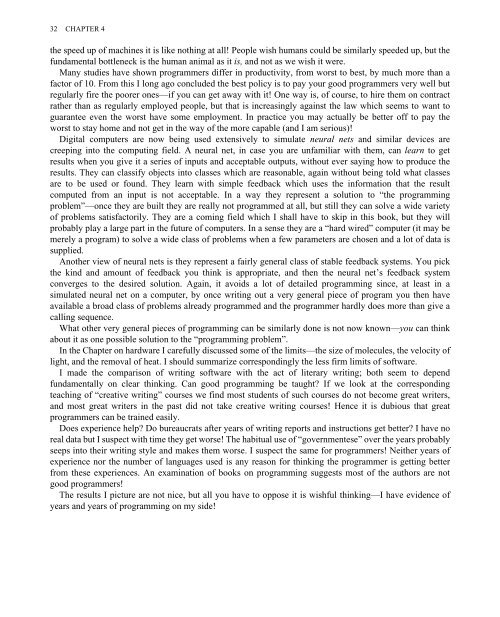hamming
hamming
hamming
Create successful ePaper yourself
Turn your PDF publications into a flip-book with our unique Google optimized e-Paper software.
32 CHAPTER 4the speed up of machines it is like nothing at all! People wish humans could be similarly speeded up, but thefundamental bottleneck is the human animal as it is, and not as we wish it were.Many studies have shown programmers differ in productivity, from worst to best, by much more than afactor of 10. From this I long ago concluded the best policy is to pay your good programmers very well butregularly fire the poorer ones—if you can get away with it! One way is, of course, to hire them on contractrather than as regularly employed people, but that is increasingly against the law which seems to want toguarantee even the worst have some employment. In practice you may actually be better off to pay theworst to stay home and not get in the way of the more capable (and I am serious)!Digital computers are now being used extensively to simulate neural nets and similar devices arecreeping into the computing field. A neural net, in case you are unfamiliar with them, can learn to getresults when you give it a series of inputs and acceptable outputs, without ever saying how to produce theresults. They can classify objects into classes which are reasonable, again without being told what classesare to be used or found. They learn with simple feedback which uses the information that the resultcomputed from an input is not acceptable. In a way they represent a solution to “the programmingproblem”—once they are built they are really not programmed at all, but still they can solve a wide varietyof problems satisfactorily. They are a coming field which I shall have to skip in this book, but they willprobably play a large part in the future of computers. In a sense they are a “hard wired” computer (it may bemerely a program) to solve a wide class of problems when a few parameters are chosen and a lot of data issupplied.Another view of neural nets is they represent a fairly general class of stable feedback systems. You pickthe kind and amount of feedback you think is appropriate, and then the neural net’s feedback systemconverges to the desired solution. Again, it avoids a lot of detailed programming since, at least in asimulated neural net on a computer, by once writing out a very general piece of program you then haveavailable a broad class of problems already programmed and the programmer hardly does more than give acalling sequence.What other very general pieces of programming can be similarly done is not now known—you can thinkabout it as one possible solution to the “programming problem”.In the Chapter on hardware I carefully discussed some of the limits—the size of molecules, the velocity oflight, and the removal of heat. I should summarize correspondingly the less firm limits of software.I made the comparison of writing software with the act of literary writing; both seem to dependfundamentally on clear thinking. Can good programming be taught? If we look at the correspondingteaching of “creative writing” courses we find most students of such courses do not become great writers,and most great writers in the past did not take creative writing courses! Hence it is dubious that greatprogrammers can be trained easily.Does experience help? Do bureaucrats after years of writing reports and instructions get better? I have noreal data but I suspect with time they get worse! The habitual use of “governmentese” over the years probablyseeps into their writing style and makes them worse. I suspect the same for programmers! Neither years ofexperience nor the number of languages used is any reason for thinking the programmer is getting betterfrom these experiences. An examination of books on programming suggests most of the authors are notgood programmers!The results I picture are not nice, but all you have to oppose it is wishful thinking—I have evidence ofyears and years of programming on my side!


